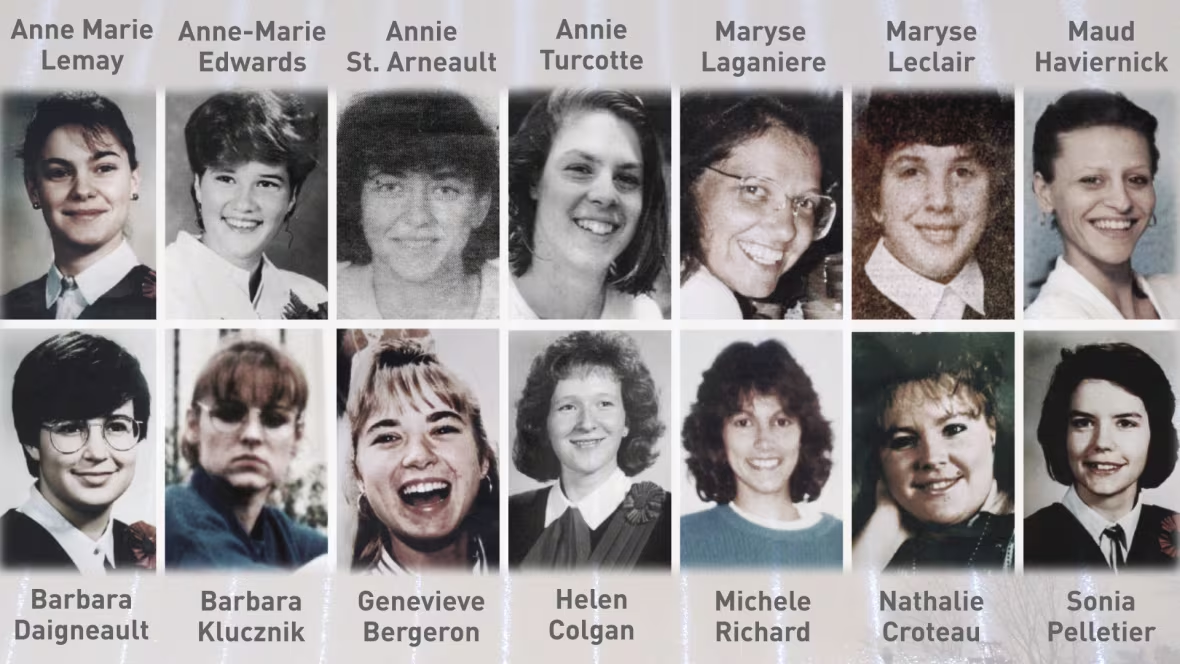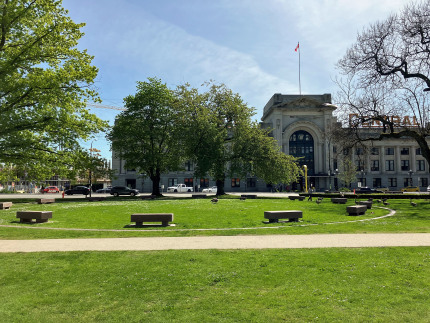A Day Rooted in Tragedy: Remembering the Montreal Massacre

A Crisis Exposed: Renfrew County, Portapique, and Beyond
While the Montreal Massacre is a well-known historical example, Canada continues to grapple with male violence against women. Events such as the Renfrew County Killings, the Portapique Tragedy, and numerous other incidents reveal a disturbing trend of escalating violence toward women—particularly in intimate partner and familial relationships. In 2024 alone, 20 women in British Columbia were killed due to femicide, which is double the average rate over the past decade. Nationwide, the rates of femicide continue to rise.
The heartbreaking story of Stephanie Forster, a woman murdered despite having a protection order in place, illustrates the failures of the justice system to protect women in dangerous situations. These systemic failures are compounded by issues like precarious housing, which often leaves women trapped in unsafe environments, vulnerable to abuse and murder. Femicide is a direct consequence of this violence and inequality.
Missing and Murdered Indigenous Women and Girls: Genocide and Systemic Failure
The epidemic of Missing and Murdered Indigenous Women and Girls (MMIWG) is one of the most devastating examples of gender-based violence in Canada. Indigenous women are disproportionately targeted for violence, with research showing that they are 12 times more likely to be murdered or go missing than non-Indigenous women. This crisis has been recognized as a genocide by the 2019 Final Report of the National Inquiry into MMIWG, underscoring the devastating impact of systemic racism, colonization, and patriarchy.
This ongoing genocide is rooted in the historical and structural marginalization of Indigenous women. Indigenous women and girls face intersecting barriers such as poverty, housing insecurity, and over-policing, as well as systemic neglect from law enforcement and government agencies. Many families of missing and murdered Indigenous women continue to wait for justice, with countless cases unresolved or dismissed.
Addressing the MMIWG crisis requires a comprehensive response informed by the Calls for Justice from the National Inquiry, including:
- Investing in Indigenous-led safety solutions, housing initiatives, and community programs.
- Ensuring culturally appropriate and trauma-informed services for Indigenous women and girls.
- Reforming law enforcement practices to prioritize thorough investigations and accountability in cases of missing and murdered Indigenous women.
This genocide cannot be separated from Canada’s femicide crisis. It is an urgent reminder of the intersectional nature of gender-based violence and the systemic changes required to end it.
The Marker for Change: Feminism and the Fight Against Male Violence
Organizations like BWSS are deeply committed to addressing the root causes of gender-based violence, particularly male violence against women. At the heart of their efforts is feminism, which recognizes that male violence is not an isolated issue but a reflection of deep-seated societal norms that perpetuate the oppression of women. Feminism seeks to dismantle the patriarchal systems that allow violence, discrimination, and inequality to thrive.
The Women’s Monument Committee, which advocates for memorials like the Marker for Change, plays a critical role in honouring the victims of femicide while pushing for societal transformation. These memorials symbolize the urgent need for change and serve as a reminder that we must act to stop future tragedies. Feminism calls for systemic reform, not only in laws but also in cultural attitudes that normalize male aggression and entitlement toward women.
The Women’s Monument Committee, a dedicated group of feminists, survivors, and advocates, has been at the forefront of efforts to confront gender-based violence and honor the women who have lost their lives to femicide. Their work centers on the Marker for Change, a powerful public memorial located in Vancouver, which commemorates the 14 women murdered at École Polytechnique on December 6, 1989, and all women killed by male violence.

The Marker for Change, a striking installation in Thornton Park, was unveiled in 1997 after years of advocacy, fundraising, and collaboration spearheaded by the Women’s Monument Committee. This monument represents more than a tribute; it is a bold and enduring call to action. Each element of the memorial—the circular design, the engraved names, and the central space for reflection—invites visitors to confront the realities of male violence and commit to systemic change. It stands as both a place of mourning and a site of collective resolve to end gender-based violence.
At its core, the Marker for Change is rooted in feminism, a framework that recognizes male violence against women as a systemic issue. Feminism underscores the interconnectedness of personal experiences of violence and broader societal norms that sustain patriarchy. The Women’s Monument Committee envisions the Marker for Change as a catalyst for dialogue, education, and transformation, challenging cultural attitudes that normalize male aggression and entitlement toward women.
By advocating for memorials like the Marker for Change, the Women’s Monument Committee emphasizes the importance of public recognition of the femicide crisis. These spaces are not merely symbolic; they serve as platforms for societal transformation, where conversations about accountability, justice, and prevention can take shape. The Marker for Change calls on all of us to dismantle the systems of violence, discrimination, and inequality that persist in Canada.
The work of the Women’s Monument Committee highlights the urgency of addressing gender-based violence at its roots. Their commitment demonstrates that remembering the past is essential to building a future free from violence. Feminism demands more than reform—it calls for a cultural shift that prioritizes the safety, dignity, and equality of all women. The Marker for Change is a testament to this ongoing fight and a rallying point for action against male violence in every form.
Addressing Systemic Failures: Legal Reform and Accountability
BWSS’s latest report “Justice or ‘Just’ a Piece of Paper?” underscores the critical gaps in Canada’s approach to preventing and addressing gender-based violence, specifically femicide. Their recommendations call for urgent legal reforms, including:
- Recognizing femicide as a distinct crime in the Canadian Criminal Code, to ensure that the unique nature of this violence is fully acknowledged and prioritized.
- Mandatory coroner’s inquests in femicide cases to investigate systemic failures and identify areas for reform.
- Universal enforcement of protection orders to safeguard women who are at risk of harm.
- Prioritizing child safety in family law cases to ensure that children are not placed in environments where violence is a threat.
Event Details: A Call for Solidarity and Action
To mark this National Day of Remembrance, BWSS will host a community gathering to amplify the voices of survivors and families affected by femicide.
- When: 10 AM, December 6, 2024
- Where: Thornton Park, Vancouver, on the unceded and unsurrendered territories of the xʷməθkwəy̓əm (Musqueam), Skwxwú7mesh (Squamish), and səlil̓wətaʔɬ/Selilwitulh (Tsleil-Waututh).
This gathering will not only serve as a space for remembrance but will also act as a call to action. It is an opportunity for individuals and communities to stand in solidarity with survivors, demand accountability from all levels of government, and push for societal and systemic change.
A Call to Action: Fighting Back Against Femicide and Genocide
BWSS is urging all Canadians to join in the fight against femicide, male violence against women, and the ongoing genocide of Indigenous women and girls. Here are several ways you can contribute to the cause:
- Advocate: Share BWSS’s message on social media to help raise awareness and demand immediate action from all levels of government.
- Donate: Contribute to BWSS’s work to provide survivor-centered services and support efforts to create systemic change – responding to over 50,000 requests for service annually.
- Engage: Hold all levels of government accountable and demand action to address the femicide and MMIWG crises.
Conclusion: A Future Free from Violence
The rise in femicides, the persistent threat of male violence against women, and the genocide of Indigenous women and girls are symptoms of a society that continues to fail its most vulnerable citizens. The National Day of Remembrance and Action on Violence Against Women is not only a time to reflect on the lives lost but also a critical opportunity to demand an end to this violence.
Through collective action and unwavering commitment, we can fight for a future where safety is a right for all women and children. On December 6th, let us stand together to say “no more” to femicide, male violence against women, and the genocide of Indigenous women and girls, and demand the systemic changes necessary to create a safer and more just society for all.
At the heart of their efforts is feminism, which recognizes that male violence is not an isolated issue but a reflection of deep-seated societal norms that perpetuate the oppression of women. Feminism seeks to dismantle the patriarchal systems that allow violence, discrimination, and inequality to thrive. The Women’s Monument Committee, which advocates for memorials like the Marker for Change, plays a critical role in honoring the victims of femicide while pushing for societal transformation. These memorials symbolize the urgent need for change and serve as a reminder that we must act to stop future tragedies. Feminism calls for systemic reform, not only in laws but also in cultural attitudes that normalize male aggression and entitlement toward women.
You are not alone.
If you or someone you love is in need of support, please contact the Battered Women’s Support Services Crisis Line:
Call toll-free: 1-855-687-1868 Metro Vancouver: 604-687-1867 Email: EndingViolence@bwss.org




